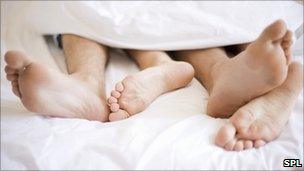One lie-in 'not enough to counter sleep loss'
- Published

A weekend lie-in may not help catch up on lost sleep
A lie-in at the weekend does not counter ill-effects of lack of sleep during the week, a study suggests.
In tests on 159 adults, US researchers found that a 10-hour "recovery" snooze was not sufficient to make up for a few nights of four hours of sleep.
Participants still scored poorly in measures of attention span and reaction times, the journal Sleep reported.
It means several nights of extra sleep may be needed for those who have been burning the candle at both ends.
Individuals in the laboratory study had two nights of 10 hours in bed.
They were then restricted to sleeping between 4am and 8am for five nights in a row.
After that they were allowed a recovery sleep of differing lengths.
Starting first thing in the morning on each day they completed a series of tests every two hours.
A small group of 17 patients were allowed 10 hours' sleep every night so their functioning could be compared with those who were sleep-deprived.
A night of recovery sleep did help improve test scores and the more sleep people had the better they did.
But even in those who had 10 hours of sleep, reaction times, lapses of attention and levels of fatigue did not return to normal.
Negative effects
Study leader Dr David Dinges, a sleep expert at the University of Pennsylvania School of Medicine, said that with severe sleep restriction, a long night's rest was not enough to catch up.
"Lifestyles that involve chronic sleep restriction during the work week and during days off work may result in continuing build-up of sleep pressure and in an increased likelihood of loss of alertness and increased errors," he said.
"The bottom line is that adequate recovery sleep duration is important for coping with the effects of chronic sleep restriction on the brain."
In previous research, Dr Dinges has found that sleeping six hours a night or fewer for two weeks has the same negative effects as two nights of total sleep deprivation.
Dr Chris Idzikowski, director of the Edinburgh Sleep Centre, said the study counters the currently held view that there is "tremendous recovery" in just one night's sleep.
"What the research shows is that this is not entirely accurate, it depends on precisely how much sleep loss has accumulated.
"It implies that if you haven't slept enough during the week, then to recover properly you need at least two nights' sleep to recover."